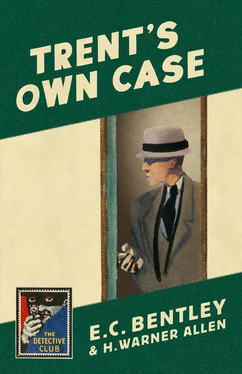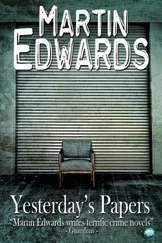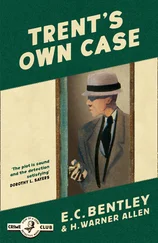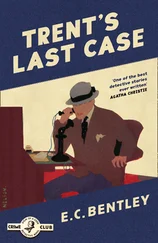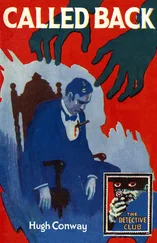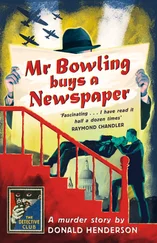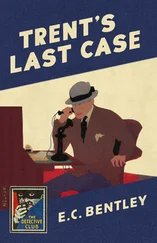CHAPTER V V. TRENT IS TAKEN ABACK VI. AN ARREST HAS BEEN MADE VII. ON A PLATE WITH PARSLEY ROUND IT VIII. THE WHITE FLOWER OF A BLAMELESS LIFE IX. THE TIARA OF MEGABYZUS X. A MATTER OF TEMPERAMENTS XI. IMPASSE XII. THE COUNT EXPLAINS XIII. FELIX POUBELLE 1884 XIV. GENIUS MUST LIVE XV. EUNICE MAKES A CLEAN BREAST OF IT XVI. THE WHISPERED WORD XVII. FINE BODY OF MEN XVIII. INFORMATION RECEIVED XIX. RESURRECTION XX. A GOLF MATCH XXI. AUNT JUDITH KNITS The Detective Story Club About the Publisher
TRENT IS TAKEN ABACK V. TRENT IS TAKEN ABACK VI. AN ARREST HAS BEEN MADE VII. ON A PLATE WITH PARSLEY ROUND IT VIII. THE WHITE FLOWER OF A BLAMELESS LIFE IX. THE TIARA OF MEGABYZUS X. A MATTER OF TEMPERAMENTS XI. IMPASSE XII. THE COUNT EXPLAINS XIII. FELIX POUBELLE 1884 XIV. GENIUS MUST LIVE XV. EUNICE MAKES A CLEAN BREAST OF IT XVI. THE WHISPERED WORD XVII. FINE BODY OF MEN XVIII. INFORMATION RECEIVED XIX. RESURRECTION XX. A GOLF MATCH XXI. AUNT JUDITH KNITS The Detective Story Club About the Publisher
TRENT stood at the sitting-room window of his small house in St John’s Wood, gazing at the sky and meditating on the enviable life lived by such men as old Blinky Fisher, in such lovely and well-tended retreats as the Cathedral Close at Glasminster. It was the evening of the day after his leave-taking of Aunt Judith at Victoria. He had driven down to Glasminster with his friend Patmore that morning, had surveyed the spectacle of Julian Pickett—looking rather more unnerved than a big-game hunter should—being married to a young woman who did not seem at all formidable; had foregathered with a number of old friends at the house of Canon Fisher, and had returned as he had gone.
The effect on his spirit had been, as he had known it would be, to discontent him with any way of life but that of the ‘mild, monastic faces, in quiet collegiate cloisters.’ Being not particularly pious, far from learned, and delighting in the society of his fellow men, Trent never came in contact with the life of piety, erudition and seclusion without yearning to be a part of it. It was, as he put it to himself in a familiar phrase of godliness and scholarship, too damned silly for words.
‘What a wonderful sunset, Mrs McOmish!’ Trent said.
His housekeeper, who was laying the table for his solitary dinner, glanced briefly at the flaming sky. ‘I’ve seen waur,’ she said. She was a person whose words, thought usually of the driest, were as usually highly charged with unspoken significance. In this case, Mrs McOmish contrived to convey the strongly held opinion that nothing was to be gained by encouraging either this sunset, or sunsets as a class.
Trent shook his head. ‘Sophisticated!’ he said sadly. ‘To you, Mrs McOmish, all nature is old, outmoded stuff, I suppose. The sublime, unapproachable self-sufficiency of art—that is your whole creed.’
‘No the whole,’ Mrs McOmish replied guardedly. ‘I dinna ken what a’ that means aboot airt, and it may be pairt of the confession of the United Presbyterian Kirk, but there’s a guid deal else forbye, I assure ye.’
‘I shouldn’t wonder,’ Trent said absently. ‘But a truce to theology, Mrs McOmish. We were talking animatedly about the sunset, and you were just going to recall to me those moving lines in which Sir Walter Scott describes a similar phenomenon in the neighbourhood of the Trossachs. But what says another poet, Mrs McOmish; the one who uttered nothing base, though occasionally something silly? It is, he observed, a beauteous evening, calm and free—’
‘Weel, we a’ ken there’s nae chairge for it,’ Mrs McOmish admitted.
‘The holy time is quiet as a nun, breathless with adoration—’
‘It’s a peety,’ Mrs McOmish commented with some severity, ‘he couldna appreciate the weather without being popish aboot it. There’s a gentleman turning in at the gate, Mr Trent. Is it a friend of yours? Is it like he’ll be staying to dinner?’
Trent looked at the tall, quietly dressed young man who was approaching the house. ‘I know who it is,’ he said, ‘though he is a good deal changed in his looks. He doesn’t give me the idea that dinner would agree with him just now—had some kind of a shock, I should think. Now,’—Trent went nearer to the window—‘what on earth can it be that he’s picking up from the path?’
Mrs McOmish, an elbow clasped in either hand, also came to overlook the proceedings of the visitor. ‘It might be a wee piece of coal,’ she opined, with more display of interest than she usually permitted herself. ‘We had the new coal in three days syne. It’s terrible good luck to pick up a wee piece of coal—or what is better still, an auld rusty nail. Only the nail maun be crookit, ye ken. Oh ay, it’s a nail; he’s putting it in his inside pouch. Twenty years, and mair, I’ve keepit a rusty nail I found just by the Tammas Coats statue in Dunn Square—Oh preserve us! What a loup he gave, Mr Trent, seeing ye at the window!’
‘His nerves must be in a shocking state,’ Trent said. ‘There’s never been anything frightening about me, has there, Mrs McOmish? The beasts that roam over the plain my form with indifference see; let alone the private secretaries of Congregationalist millionaires. Well, if he wants to see me, will you show him into the studio? It isn’t so maddeningly tidy in there.’ And Trent walked to the door communicating with that scene of his labours.
‘I wouldna wonder!’ the housekeeper said grimly. ‘Ye’ve been in it a full half hoor since ye came back.’ She went out to admit the visitor.
‘Mr Verney to see you, sir,’ Mrs McOmish soon announced in what she would have described as an English voice.
Mr Verney, whose age might have been guessed at twenty-seven or thereabouts, was a person of somewhat damaged aspect, for he looked harassed and distraught to the last degree. But there was nothing weak in the essence of his appearance. His frame was spare and athletic, his carriage erect, and in his fresh-coloured eagle-featured face there was a pair of restless bright-blue eyes that did not give an impression of spiritual sloth.
It was he who spoke the first words as his hand met Trent’s in a rather perfunctory salutation.
‘What do you think,’ he said earnestly, ‘of this terrible news?’
‘What do you mean?’ Trent said. ‘I haven’t heard of any terrible news, believe me, my dear fellow. I only hope it’s not too bad—for you.’
Verney stared at him intensely. ‘How can you have missed it?’ he demanded, with a puzzled look in his very expressive eyes. ‘It’s been in all the early afternoon papers—it’s all over the town. Or do you mean that old James Randolph’s death doesn’t distress you at all?’
Trent was thoroughly taken aback, and for the best of reasons. Himself, at a little after six o’clock the evening before, he had left the same James Randolph not only alive but in a furiously bad temper, a picture of choleric vitality. ‘Randolph dead!’ he said blankly. ‘Why, did he have a stroke or something?’
‘A bullet was what killed him, Trent,’ Verney said coldly. ‘I can’t conceive—’
‘Oh! he was shot!’ A light broke over Trent’s mind. ‘Now I understand. You see, Verney, I drove down to Glasminster to a wedding this morning, and I’ve only just got back after all the merrymaking. If anyone had heard of it down there, it wasn’t mentioned in my hearing. But the early editions! They all had it, of course—I see that now. But you know how they like to keep you guessing. On the way back, I should think I saw a score of bills saying that a well-known millionaire had been found shot. I didn’t care if fifty millionaires, each more well-known than the last, had been found shot. It never occurred to me that it was Randolph. My dear fellow, what a shocking thing! It must have been a bad blow for you, being what you were to him. Tell me what happened.’
Читать дальше
